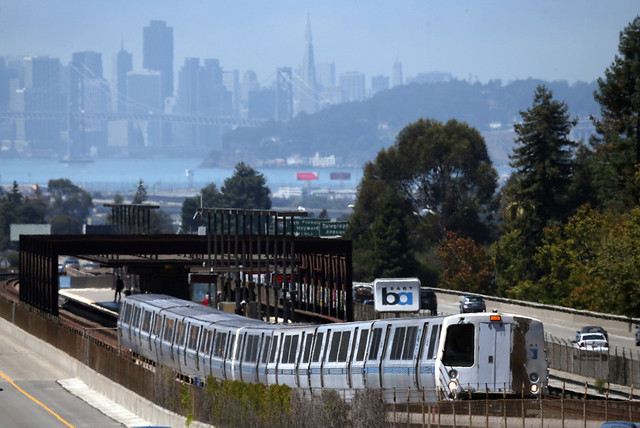Union representatives appeared at an open session of the BART board Friday morning and called on directors to approve the contract as it stands. After the board indicated it will not approve the agreements, SEIU Local 1021 Executive Director Pete Castelli accused the agency of trying to back out of a deal it had agreed to.
Singling out a tentative agreement they prepared and agreed to in July and citing over-inflated numbers, BART Management is trying to hit the reset button and renege on the agreement that their $399,000 chief negotiator bargained for them.
Make no mistake: there was no confusion or glitch in the agreement. BART’s high-priced chief negotiator Thomas Hock, Assistant General Manager Paul Oversier, and Labor Relations Manager Rudy Medina, signed an agreement that would allow BART workers time off to care for their family members with a serious illness.
The BART board on Friday released a contract timeline it says shows it never agreed to the family leave provision. A BART “fact sheet” that includes a Q&A on the dispute reiterates that claim and adds this:
How could something like this happen when you have a highly paid team of negotiators acting on the District’s behalf?
Mistakes happen in the business world and in life every day. That is not an excuse — it is just a fact. During a final review process, the mistake was caught by staff before the BART Board voted on the contract and it will be fully vetted before the contract is considered.
A separate timeline published Friday by the Contra Costa Times reflects some of the unions’ account of events and disagrees sharply with BART’s chronology. For instance, both sides report the family leave issue came up in late may and early June. The BART account says BART twice rejected the proposal and the unions withdrew it. According to the Times, the union says they discussed the issue “with little feedback from Hock.”
Both sides agree that the proposal was included in a package of tentative agreements signed July 19. BART says the family leave proposal was mistakenly included in the package even though it had been rejected and withdrawn. The unions say that the provision was part of the tentative contract from that point on and that BART never raised any problems with it until after after the unions formally ratified the agreement on Nov. 1.
Original post, Thursday 7:15 p.m.: For all of you who haven’t quite had your fill of BART contract disputes, here’s breaking news. BART management announced tonight that there might be problems with the contracts it just got done negotiating with its two biggest unions (and which the unions have already ratified):
BART management believes that a provision that it did not agree to was inadvertently included in the final labor package, which is scheduled to be considered by the BART Board next week. BART is currently costing out the impact of the provision.
The BART Board will have to factor this item into its ratification decision next week.
For clarification, the purpose of tomorrow’s closed Board meeting is to review all the tentative agreements that are a part of the labor contract. The Board is scheduled to vote on the contract on Thursday, November 21, 2013.
What’s the “inadvertently included” provision? Piecing together other news reports, it’s language connected to the transit agency’s family leave policy. From ABC7 News:
The problem has to do with what BART considers a mistake in a clause that grants too much paid family leave to union workers. … Sources tell ABC7 News that a page in the agreement somehow made it into the final draft and was signed by all the negotiators. However, BART officials claim they had rejected the provision and the union had verbally agreed to take it out.
The new contract states that BART will give full pay for the first six weeks. The old language said employees need to use sick leave and vacation time first. Sources tell ABC7 News that when BART management discovered the mistake, the unions said the clause could not be withdrawn.
As you’ll no doubt remember, the contracts were settled after a six-month-long dispute that included two strikes (each of four-plus days) and two cooling-off periods.

